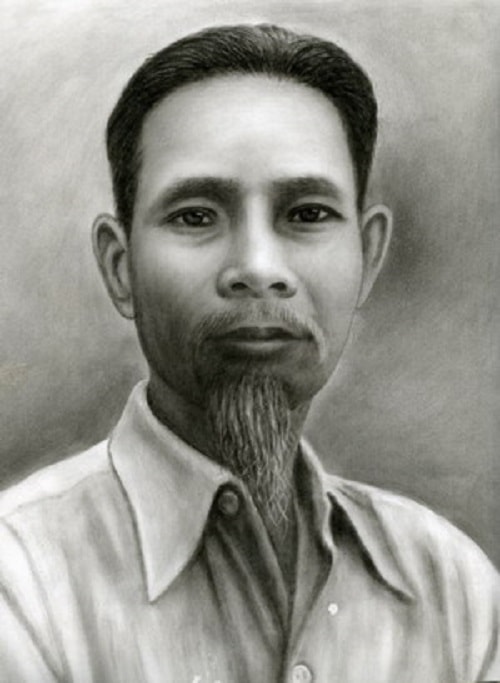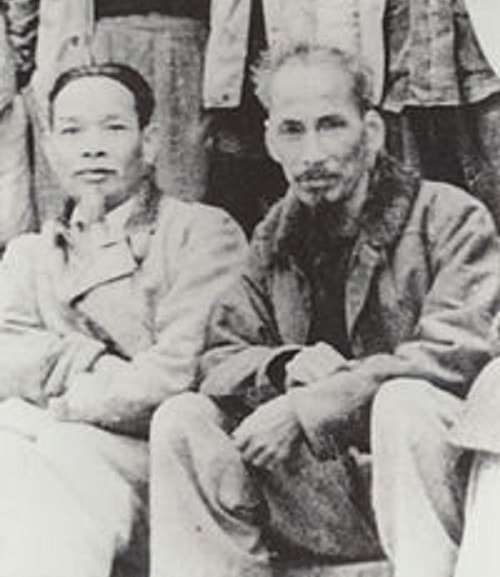Ho Tung Mau: An excellent son of his homeland Nghe An
(Baonghean) - Comrade Ho Tung Mau's real name is Ho Ba Cu, born on June 15, 1896 in Quynh Doi village, Quynh Luu district, Nghe An province in a family with a rich tradition of mandarin education and patriotism. Born and raised in a country and world with many great changes, combined with the tradition of his homeland, his family soon instilled in the young Ho Ba Cu a spirit of revolutionary patriotism and hatred of imperialism. From a patriot, Ho Tung Mau became a communist soldier, a veteran revolutionary cadre in the cause of national liberation.
 |
| Portrait of Mr. Ho Tung Mau |
In 1916, Ho Tung Mau left his family and taught in Thanh Chuong and Anh Son districts, Nghe An province, hoping to find like-minded friends. At the end of April 1920, with the help of some patriotic families in his hometown, Ho Tung Mau, Le Hong Son and Ngo Quoc Chinh went to Thailand, and then 3 months later went to China to find Nghe An revolutionary activists who were carrying out revolutionary activities there, such as Phan Boi Chau, Ho Hoc Lam... Ho Tung Mau and Le Hong Son founded Tam Tam Xa, gathering a group of enthusiastic, determined young people with the same aspirations, sacrificing personal interests, plotting together to liberate the nation, with the aim of gaining independence for Vietnam from the French colonial regime.
In the spring of 1924, Ho Tung Mau returned to the country, returned to Quynh Luu, Yen Thanh to operate under the name Phan Tai. In November 1924, the Tam Tam Xa group was helped by Nguyen Ai Quoc to change its direction of operation, building a revolutionary organization following the correct path. In June 1925, Ho Tung Mau and Le Hong Son helped Nguyen Ai Quoc build the Vietnam Revolutionary Youth Association, in which the Communist Group had 5 members, Ho Tung Mau also participated...
In June 1931, Ho Tung Mau was arrested by the French colonialists for the second time in Shanghai. They transferred him to Hoa Lo prison (Hanoi) and sentenced him to death by the Nghe An Court, but due to his appeal, they forced them to reduce the sentence to life imprisonment. From December 1931 to March 1945, he was transferred to prisons: Vinh, Lao Bao, Kon Tum, Buon Ma Thuot... The harsh prison life tempered Ho Tung Mau's optimism, fostering the spirit, comradeship, and patriotism of a true Communist.
In March 1945, taking advantage of the situation of the Japanese fascists' coup against the French, Ho Tung Mau and a number of political prisoners escaped from Tra Khe concentration camp, Phu Yen province and returned to his hometown to work at the Central Region Party Committee office. When Ho Tung Mau just returned to Quynh Doi commune, Quynh Luu district, the Tran Trong Kim government immediately invited him to be a political advisor, but he resolutely refused. At that time, in Quynh Luu district, the reactionary propaganda group hung flags shouting "Support the Vietnam Independence League", organized rallies in Cau Giat town but were boycotted by Ho Tung Mau and the people. Ho Tung Mau propagandized and mobilized people in the village and commune to help each other to relieve hunger, wholeheartedly instructed party cadres to organize the Viet Minh movement firmly and widely in the spirit of not being subjective or impatient in the matter of uprising. He also mobilized his brothers and descendants in the family, especially encouraging and creating conditions for his son Ho My Xuyen (later holding the position of Deputy Secretary of Nghe An Provincial Party Committee) - a Viet Minh cadre in the commune to actively participate in preparing for the uprising. Thanks to that, Quynh Doi village had hundreds of members for national salvation. And in July 1945, Quynh Doi commune established the National Liberation Committee. Ho My Xuyen was appointed to participate in the Uprising Committee of Quynh Luu district and Quynh Luu was the earliest district to gain power in Nghe An province on August 18, 1945.
After the success of the August Revolution in 1945, comrade Ho Tung Mau was assigned many important responsibilities: Principal of Nhuong Ban Military School, Chairman of the Resistance Committee of Inter-Zone IV, Inspector General of the Government, Chairman of the Vietnam - China Friendship Association... No matter what position he held, he was worthy of being a "devoted leader", "devoted cadre", "loyal comrade". He set a shining example of revolutionary ethics: diligence, thrift, integrity, impartiality. He was a vivid embodiment of a person who was both a leader and a truly loyal servant of the people. He constantly cared for building the great national unity bloc.
During his business trips to Nghe An, comrade Ho Tung Mau left good feelings and impressions on the cadres and people of his home province about the knowledge and familiarity of a dedicated, exemplary leader. Every time he visited Quynh Doi village, the three-room thatched house was always packed with people coming to visit and listen to him talk about the resistance situation. He inspected militia training, attended and spoke at meetings of youth and women. During his business trips to the grassroots, he went to each commune, met each cadre, listened to the work situation, the thoughts and aspirations of the people and gave detailed comments on all work as well as the leadership of the commune cadres. He often reminded: The Party must be close to the masses, avoid bureaucracy and orders. Party members must be exemplary and take the lead in all work. He also often reminded cadres of the four words: "elite soldiers, simple government" (If the country wants to be strong, the army must be elite, the administrative apparatus must be streamlined). Many commune cadres did not fully understand the meaning of the two words "revolution" and so made "childish leftist" mistakes, but were all reminded by the comrade with understanding and reason. The comrade said that cholera killed some people, and leftism killed the entire revolutionary cause.
Returning to his homeland, wherever he went, he called on cadres not to destroy temples, pagodas, or cut down ancient trees. Coming to a village in Do Luong district, seeing people destroying the Phat Ke pagoda (built during the Ly dynasty), he explained: Revolution is not like that. Not everything old, the revolution must destroy to make new things. The revolution must protect the architectural and sculptural works of our ancestors. The revolution must respect the people's freedom of belief. Seeing the ancient cotton tree at Dong Tuong pagoda (Quynh Doi, Quynh Luu) being cut down, he criticized: The cotton tree and the banyan tree are traces of the birth of our village. Anyone who goes far away to the village, 10 kilometers away from the village, can see the cotton tree and the banyan tree. Memories of the homeland, love for the homeland, and deep attachment to the homeland started from there, why did you cut them down? The ancient tree brings shade to the village, adds beauty to the hamlet, how could you bear to destroy it? You must stop doing bad things immediately.
Every time he returned to his hometown, he often emphasized the slogan of solidarity. At the Quynh Luu District Party Congress in 1947, there was a heated debate about a number of leftist phenomena in some communes. The Provincial Party Committee member in charge of the Inter-District Secretariat of Dien, Yen, and Quynh had an opinion that tended to defend the above phenomena, saying that people should just do things freely and not be afraid... Comrade Ho Tung Mau criticized: That way of thinking is not correct, it will not prevent mistakes but will only develop. And emphasized: The revolution must unite all forces, arouse the patriotism of everyone, promote the talents and strength of everyone to bring the resistance and nation-building to victory.
From the day he started participating in revolutionary activities until he became a leader, comrade Ho Tung Mau was always a very simple cadre. His working style was to gather, persuade, organize the masses and set an example in his daily thoughts and actions. His modesty and simplicity in life along with his deep respect for the people helped comrade Ho Tung Mau skillfully perceive the mood and aspirations of the masses, and sensitively grasp the issues raised by the daily lives of the masses. Thanks to that, comrade Ho Tung Mau proposed and solved many important tasks with high results. As a leader, he set a very specific example of steadfastness in principles and dynamism and creativity in practical application. His good qualities left a very deep impression on cadres and people...
 |
| Uncle Ho Tung Mau and Uncle Ho |
During his revolutionary career, comrade Ho Tung Mau was arrested and imprisoned by the enemy many times under harsh and brutal regimes in imperialist prisons. However, with the indomitable will of a communist soldier, he always believed, was optimistic, loved, and was loyal to the Fatherland, the Party, and the people. Comrade Ho Tung Mau was a shining example of revolutionary ethics. With his own relatives, he had deep affection and love. Many times, he suppressed his own pain to stand firm and follow the path he had chosen. With his homeland, he was close and shared responsibility. With his colleagues, he was attentive and thoughtful. With his work, he was devoted and selfless... No matter where he was or what the circumstances, he always showed his indomitable will, steadfastness, loyalty to the country, and devotion to the people; demonstrating excellent all-round abilities in politics, military, and culture. The morality, personality and style of comrade Ho Tung Mau carry many cultural values, which up to now, are still relevant and have a profound educational effect on our generation today and tomorrow. His name is the pride of the Party, the country, the homeland and the Vietnamese people.
On his career path, no matter where he is or what position he holds, comrade Ho Tung Mau always has the best and warmest feelings for his hometown Nghe An, Quynh Luu district. He has spent a lot of time visiting and giving valuable contributions to the Party Committee and people of Nghe An to build his hometown to be more developed, civilized and prosperous.
Comrade Ho Tung Mau is the pride of the people of Nghe An, the son who has made his homeland and the Ho family famous. Proud to be the homeland of comrade Ho Tung Mau, the Party Committee and people of Nghe An always promote the spirit of solidarity, democracy, creativity, innovation, successfully carry out the tasks of socio-economic development, first of all, successfully carry out the goals and tasks set forth by the 18th Provincial Party Congress, contributing together with the whole country to successfully implement the Resolution of the 12th Party Congress, gradually building Nghe An homeland to be more and more beautiful, civilized, worthy of the position of a spiritual land of talented people and revolution - the homeland of comrade Ho Tung Mau and other exemplary revolutionary predecessors.
PHUC HOP LAKE
(Standing Committee Member, Head of the Provincial Party Committee's Propaganda Department)


